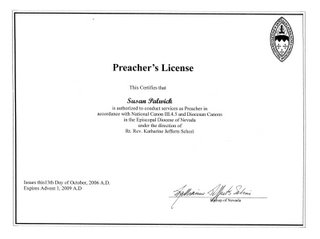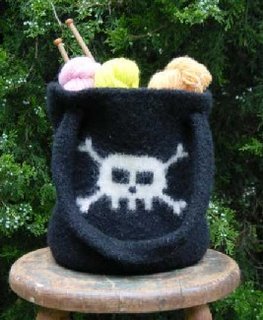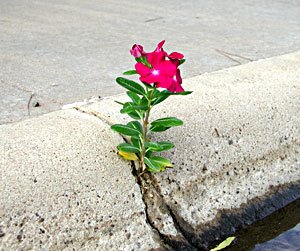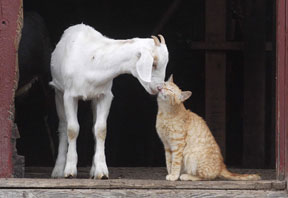
Here's a really old homily; I preached it on Mother's Day, 2003 (May 11). Since then, I've preached two other times on Mother's Day, and all three times, I've talked about my cats. It's now something of a parish tradition.
We're nowhere near Mother's Day, of course. I'm posting this because yesterday,
Marcia responded to my post from Monday and included a picture of sheep. In her comments section, you'll find remarks about sheep and goats. There's also been some
recent discussion on Marcia's blog about requirements for parenthood, and I just learned that
Kim's a cat person (as so many of the best people are). So all of that made me want to post this homily.
I have to admit that this is still one of my favorites. You can also find it in
Sermons That Work XII: Preaching as Pastoral Caring. The Gospel is
John 10:11-16.
* * *
At one of my preacher-in-training classes, we talked about difficult preaching occasions. Mother’s Day was near the top of the list. This is a secular Hallmark holiday which preachers nonetheless ignore at their peril. If we don’t talk about it, we offend Family Values. If we do talk about it, we may cause pain to anyone who wants to have children and hasn’t been able to, or who doesn’t want to have children and has been criticized for it. We may grieve parishioners who have lost a mother or a child, not to mention those who aren’t getting along with their mothers or their children. There are lots of ways for people to feel left out on Mother’s Day.
Just for the record, I get along very well with my mother. But my husband and I have chosen not to have children. We have cats. I’ve endured my share of insensitive remarks about this decision, so I bring my own baggage to Mother’s Day.
To go along with this over-sentimentalized landmine of a holiday, we have one of the most over-sentimentalized passages in the Gospels: Jesus as the Good Shepherd. Jesus seems to have been fond of sheep, which is fitting for someone known as the Lamb of God. Today’s reading goes nicely with that other Gospel story about the lost lamb, the lone wanderer Jesus goes out of his way to find and rescue. We know we’re the sheep in these stories, and that’s comforting. After all, the separation of the sheep from the goats is one of the Bible’s images of Judgment Day. As you probably remember, the goats do not get the better end of the bargain.
But we’re the sheep, and that means that Jesus is going to protect us. We don’t have to be afraid of wolves, or of getting lost. We don’t have to be afraid of the dark. Jesus is the good shepherd who cares for us, his fluffy, adorable lambs. It’s all very cozy.
The problem here is that being reduced to a pet, or even a valuable piece of livestock, doesn’t sit well with everyone. Being compared to sheep is not especially flattering. We usually call people “sheep” if we consider them passive herd animals who can’t think for themselves. My friend Clare, a cradle Episcopalian, is deeply offended by this analogy. She thinks the Bible got it backwards. Clare is indignantly, militantly pro-goat. Goats, Clare says, are much smarter than sheep. They’re hardier. They’re healthier. They have much more personality. Take that, sheep!
Looking for arguments in favor of sheep, I did some Internet research. I was delighted to find a
website put together by real live sheep farmers, complete with a list of the ways in which sheep are different from goats. Surely these people would be loyal to their own flock. Surely I was about to read a passionate testimonial to the intelligence and motivation of sheep.
Well, no. One of the items on the “sheep versus goats” list reads, “Sheep are stupid; goats are smart. We like sheep, but we wouldn’t bet money on a lamb trying to find its way out of a maze.” Score one for Clare. I also learned that sheep tend to get very dirty in very unpleasant places, and that they suffer from a lot of really yucky diseases. Lambs, however, do recognize the voices of the people who feed them, and they’re undeniably adorable.
At this point in my sermon preparation, I was on the verge of writing a homily about how wonderful it is that Jesus loves us even when we’re dirty and stupid. And this is true: Jesus
does love us even when we’re dirty. He loves us even when we’re too dense to understand his parables. He loves us even when we’re not adorable. Jesus does find us and bring us home when we’re lost, wandering in the dark and the cold, and Jesus did lay down his life to protect us.
In these ways, of course, the Good Shepherd is like a Good Mother. Good mothers –- biological or adoptive -- stay loving even when their children need baths, even when their children are sick, even when their children aren’t doing well in school. Good mothers have died to give their children better lives. Good mothers search for lost children. Good mothers struggle to guide children who are trapped in mazes, in the bewildering byways of addiction, of crime, of depression. Good mothers love their children even when their children aren’t adorable.
But there’s another level here, because Jesus extends this maternal concern to creatures who look nothing like him. It’s not as if he loves the sheep because they have his own eyes or his Aunt Bertha’s nose. He doesn’t give his life for his flock out of an overwhelming instinct to ensure that his own genes, or his own name, will survive in the world. Jesus isn’t related to the sheep, biologically or by adoption. They’re not even the same species he is. He loves them purely because they’re vulnerable and need protection; he cares for them because he has promised to do so. His love is a function of his radical, unconditional compassion, even for creatures who are radically different from him.
The Bible tells us that we’re made in God’s image and that we’re God’s children. Sometimes these promises make us very anxious about our place in the family. Do we look enough like God? Are we even the same species? Do we have God’s eyes, or his Aunt Bertha’s nose? What today’s Gospel lesson teaches us is that we don’t have to look like God. That seemingly insulting comparison to sheep turns out to be a wonderful gift. The differences between us and sheep become a blessing, a reminder that nothing –- not even the much greater differences between us and God –- can separate us from the love of Christ.
Early in my conversion, I struggled with the notion that God loved me. Even though I do get along beautifully with my mother, unconditional love wasn’t something I understood very well. I was unclear on the concept. And then one of our three cats disappeared. He was our youngest cat and our biggest, the one who’d knock screens out of windows because he refused to stay inside where it was safe. He was our juvenile delinquent. Every day he raced over the fence in our yard, and every day he came home for supper. Until, one day, he didn’t.
We put up signs all over the neighborhood. Every day for eight weeks, I went to the local animal shelters, looking for him. We never found him. I grieved for months, trying not to imagine him lost in the dark and the cold, unable to outrun the coyotes. I tried to ignore comments like, “Well, he was just a cat. It’s not like you lost a person.” I prayed a lot.
And then at some point it clicked, and I realized, “Oh. I get it. God loves me the way I love my cats.” I love my cats even though they look nothing like me, and even though most of the time, they’re not quite as smart as I am. I love them even when they miss the litterbox or scratch the furniture. I love them even when they’re not adorable. I love them because they’re vulnerable and need protection, and because I’ve promised to take care of them.
This realization didn’t come to me during a cozy, sentimental moment. It didn’t come when my cat was curled in my lap, purring. It came when I was struggling with loss and failure, when I was haunted by my inability to protect a creature I loved, a lost lamb I was unable to retrieve. It came because I could not bring myself to say, “He was just a cat.”
According to writer Kathleen Norris, “One of the most astonishing and precious things about motherhood is the brave way in which women consent to give birth to creatures who will one day die” (
The Cloister Walk, p. 24). If this statement makes us remember Mary’s agony on Good Friday, it also reminds us that God the Immortal Father, no less than mortal Mary, was forced to witness Jesus’ death. Love is always an act of courage. It always makes us vulnerable, but never more so than when we consent to love creatures who will surely not outlive us, whose loss is therefore unavoidable. The immortal God’s love for mortal creatures -– for cats, for sheep, for people –- is an act of astonishing grace. God’s love willingly embraces the inevitable pain of mortal suffering.
But God’s love also promises that the pain will end, that there is a place beyond mortality, beyond suffering, beyond difference. “I have other sheep that do not belong to this fold,” Jesus tells us. “I must bring them also, and they will listen to my voice.” There are lots of ways for people to feel left out on Mother’s Day -– and on most other days -– but this is God’s Easter promise to all of us. However different we may feel, from God or from each other, whatever far field we’ve landed in and whatever strange flock we’re traveling with at the moment, God loves us as passionately as the most devoted mother loves her children. We all belong to Jesus, and someday we’ll all find ourselves gathered together in that final pasture: those of us who have lambs tagging along, and those of us who don’t, and those of us who’ve chosen to bring with us, instead, a beloved cat or a particularly charming goat.
Amen.
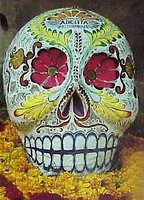 Dr. Hebert has posted a terrific edition of Grand Rounds, an homage to Poe's The Raven. ("Quoth the Intern, "Nevermore!") Nice graphic, too. I'm delighted to be included.
Dr. Hebert has posted a terrific edition of Grand Rounds, an homage to Poe's The Raven. ("Quoth the Intern, "Nevermore!") Nice graphic, too. I'm delighted to be included.
